Hyundai i30 vs Nissan Juke - Differences and prices compared
Compare performance (140 HP vs 143 HP), boot space and price (24000 £ vs 21400 £ ) at a glance. Find out which car is the better choice for you – Hyundai i30 or Nissan Juke?
Costs and Efficiency:
Price and efficiency are often the first things buyers look at. Here it becomes clear which model has the long-term edge – whether at the pump, the plug, or in purchase price.
Nissan Juke has a slightly advantage in terms of price – it starts at 21400 £ , while the Hyundai i30 costs 24000 £ . That’s a price difference of around 2606 £.
Fuel consumption also shows a difference: Nissan Juke manages with 4.70 L and is therefore noticeable more efficient than the Hyundai i30 with 5.70 L. The difference is about 1 L per 100 km.
Engine and Performance:
Under the bonnet, it becomes clear which model is tuned for sportiness and which one takes the lead when you hit the accelerator.
When it comes to engine power, the Nissan Juke has a barely noticeable edge – offering 143 HP compared to 140 HP. That’s roughly 3 HP more horsepower.
In acceleration from 0 to 100 km/h, the Hyundai i30 is hardly perceptible quicker – completing the sprint in 9.60 s, while the Nissan Juke takes 10.10 s. That’s about 0.50 s faster.
In terms of top speed, the Hyundai i30 performs minimal better – reaching 197 km/h, while the Nissan Juke tops out at 180 km/h. The difference is around 17 km/h.
There’s also a difference in torque: Hyundai i30 pulls noticeable stronger with 253 Nm compared to 200 Nm. That’s about 53 Nm difference.
Space and Everyday Use:
Beyond pure performance, interior space and usability matter most in daily life. This is where you see which car is more practical and versatile.
Both vehicles offer seating for 5 people.
In curb weight, Nissan Juke is hardly perceptible lighter – 1274 kg compared to 1291 kg. The difference is around 17 kg.
In terms of boot space, the Nissan Juke offers hardly perceptible more room – 422 L compared to 395 L. That’s a difference of about 27 L.
In maximum load capacity, the Nissan Juke performs minimal better – up to 1305 L, which is about 4 L more than the Hyundai i30.
When it comes to payload, Hyundai i30 a bit takes the win – 509 kg compared to 427 kg. That’s a difference of about 82 kg.
Who wins the race in the data check?
The Nissan Juke is narrowly ahead in the objective data comparison.
This result only shows which model scores more points on paper – not which of the two cars feels right for you.
Costs and Consumption
View detailed analysis
Engine and Performance
View detailed analysis
Dimensions and Body
View detailed analysis
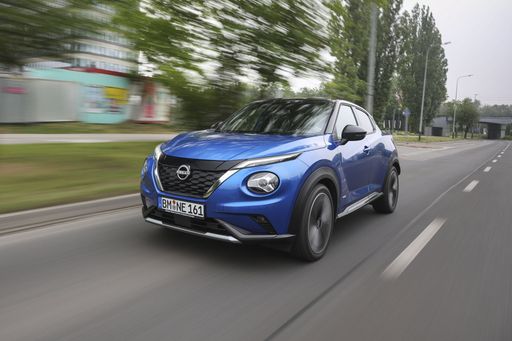
Nissan Juke
Hyundai i30
The Hyundai i30 proves that sensible can also be stylish, offering a confident driving character wrapped in neat, modern design. It serves up a roomy, well-equipped cabin and composed ride that make everyday motoring feel like a clever purchase rather than a compromise.
details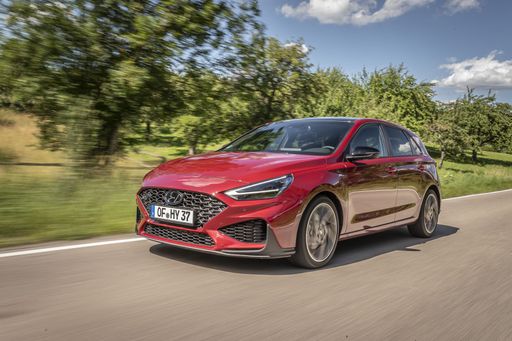
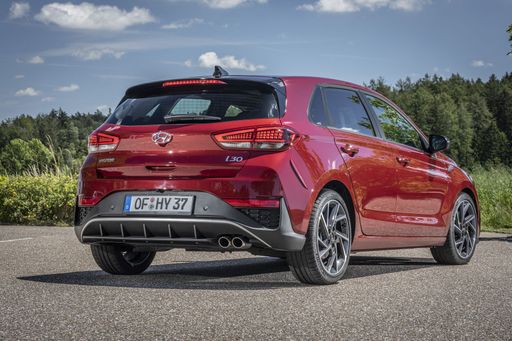
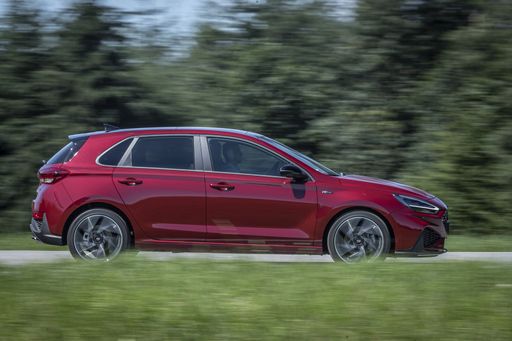
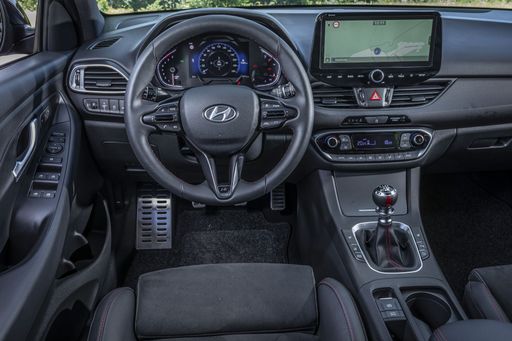
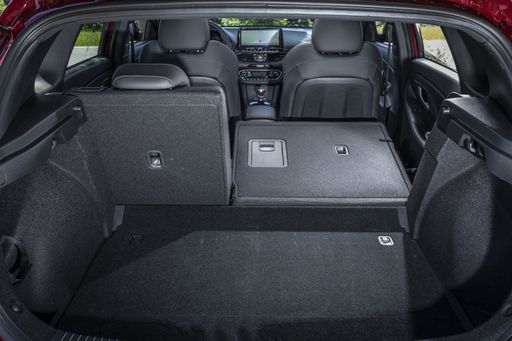
Nissan Juke
The Nissan Juke is a pocket-sized crossover that refuses to blend in, with quirky styling and a cheeky stance that turns heads at every traffic light. It’s ideal for shoppers who value personality and nimble urban driving over maximum practicality, delivering surprising pep and a well-equipped feel for everyday fun.
details
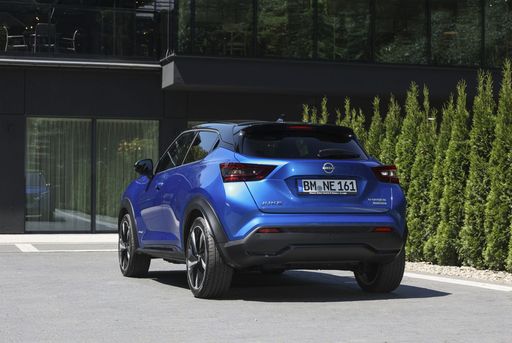
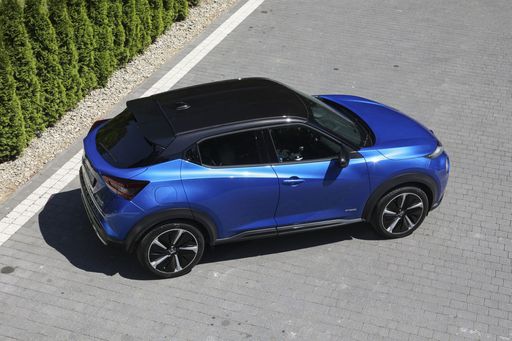

Costs and Consumption |
|
|---|---|
|
Price
24000 - 29300 £
|
Price
21400 - 30100 £
|
|
Consumption L/100km
5.7 - 6 L
|
Consumption L/100km
4.7 - 6 L
|
|
Consumption kWh/100km
-
|
Consumption kWh/100km
-
|
|
Electric Range
-
|
Electric Range
-
|
|
Battery Capacity
-
|
Battery Capacity
0.60 kWh
|
|
co2
130 - 136 g/km
|
co2
107 - 136 g/km
|
|
Fuel tank capacity
50 L
|
Fuel tank capacity
46 L
|
Dimensions and Body |
|
|---|---|
|
Body Type
Hatchback
|
Body Type
SUV
|
|
Seats
5
|
Seats
5
|
|
Doors
5
|
Doors
5
|
|
Curb weight
1291 - 1407 kg
|
Curb weight
1274 - 1405 kg
|
|
Trunk capacity
395 L
|
Trunk capacity
354 - 422 L
|
|
Length
4340 mm
|
Length
4210 mm
|
|
Width
1795 mm
|
Width
1800 mm
|
|
Height
1455 mm
|
Height
1593 mm
|
|
Max trunk capacity
1301 L
|
Max trunk capacity
1237 - 1305 L
|
|
Payload
463 - 509 kg
|
Payload
405 - 427 kg
|
Engine and Performance |
|
|---|---|
|
Engine Type
Petrol, Petrol MHEV
|
Engine Type
Petrol, Full Hybrid
|
|
Transmission
Manuel, Automatic
|
Transmission
Manuel, Automatic
|
|
Transmission Detail
Manual Gearbox, Dual-Clutch Automatic
|
Transmission Detail
Manual Gearbox, Dual-Clutch Automatic, Automatic Gearbox
|
|
Drive Type
Front-Wheel Drive
|
Drive Type
Front-Wheel Drive
|
|
Power HP
100 - 140 HP
|
Power HP
114 - 143 HP
|
|
Acceleration 0-100km/h
9.6 - 13.1 s
|
Acceleration 0-100km/h
10.1 - 11.8 s
|
|
Max Speed
178 - 197 km/h
|
Max Speed
166 - 180 km/h
|
|
Torque
172 - 253 Nm
|
Torque
200 Nm
|
|
Number of Cylinders
3 - 4
|
Number of Cylinders
3 - 4
|
|
Power kW
74 - 103 kW
|
Power kW
84 - 105 kW
|
|
Engine capacity
998 - 1482 cm3
|
Engine capacity
999 - 1598 cm3
|
General |
|
|---|---|
|
Model Year
2024
|
Model Year
2024
|
|
CO2 Efficiency Class
D, E
|
CO2 Efficiency Class
D, E, C
|
|
Brand
Hyundai
|
Brand
Nissan
|
What drive types are available for the Hyundai i30?
Available configurations include Front-Wheel Drive.




